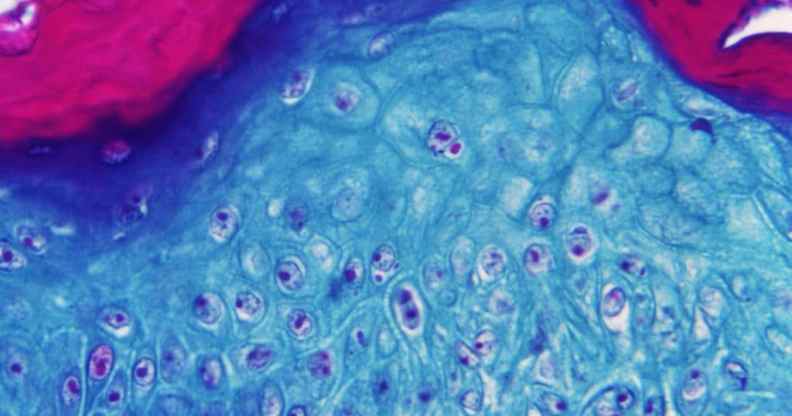Monkeypox: People with symptoms told not to have sex as 71 new UK cases confirmed

A section of skin tissue, harvested from a lesion on the skin of a monkeypox patient, under a microscope. (Smith Collection/ Gado/ Getty)
People in the UK with monkeypox symptoms are now being advised not to have sex.
On Monday (30 May), the UK Health Security Agency (UKHSA) confirmed that 71 new cases of monkeypox had been detected in England, bringing the total number of cases since 7 May to 172.
With four cases in Scotland, two in Northern Ireland and one in Wales, the UK total is now 179.
As the virus spreads, public health guidance has now been issued for managing the disease in the UK and reducing transmission.
The UKHSA said that those with “possible, probable or confirmed monkeypox” should “abstain from sex while symptomatic, including the period of early symptom onset, and while lesions are present”.
Although monkeypox is not being described as sexually transmitted, the close contact associated with sex can pass on the virus and thus far, queer men have been disproportionately affected.
“Whilst there is currently no available evidence of monkeypox in genital excretions, as a precaution, cases are advised to use condoms for eight weeks after infection and this guidance will be updated as evidence emerges,” the UKHSA said.
Those with monkeypox symptoms should avoid all other close contact “until their lesions have healed and the scabs have dried off”, should wash their own clothing and bedding, and if they must travel to seek healthcare, should “ensure any lesions are covered by cloth, wear a face covering and avoid public transport where possible”.
In treating monkeypox patients, healthcare staff should use full PPE, and pregnant of immunocompromised staff should avoid contact.
Dr Ruth Milton, the UKHSA’s senior medical advisor and monkeypox strategic response director, said: “This new monkeypox guidance sets out important measures for healthcare professionals and the public for managing the disease including how to safely isolate at home and reduce the risk to others.
“The highest risk of transmission is through direct contact with someone with monkeypox.
“The risk to the UK population remains low and anyone with unusual rashes or lesions on any part of their body should immediately contact NHS 111 or their local sexual health service.”
On Sunday (29 May), the World Health Organization (WHO) has said that monkeypox now poses a “moderate” global health risk, which could increase to “high”.
“The sudden appearance and wide geographic scope of many sporadic cases indicates that widespread human-to-human transmission is already underway, and the virus may have been circulating unrecognised for several weeks or longer,” said WHO.
It added: “The situation is evolving rapidly and WHO expects that there will be more cases identified as surveillance expands in non-endemic countries, as well as in countries known to be endemic who have not recently been reporting cases.”

